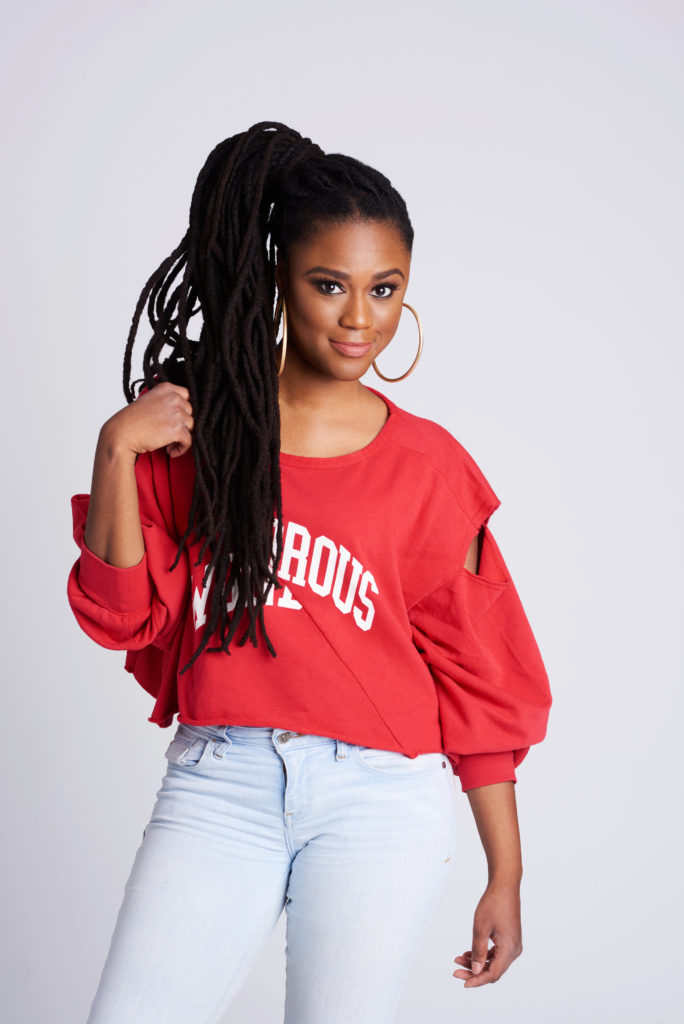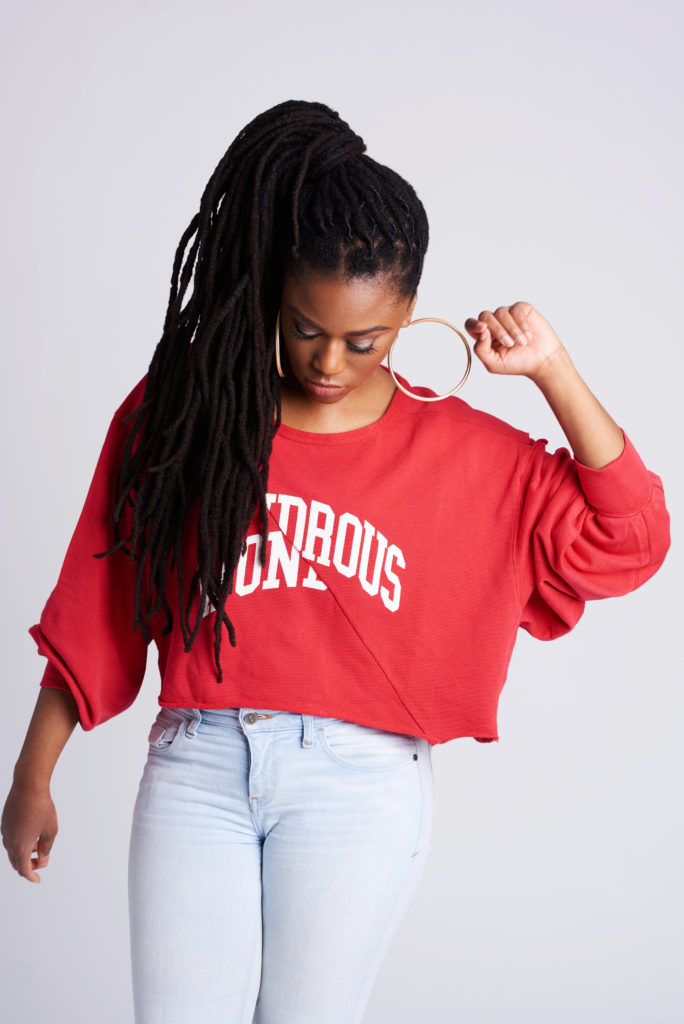5 Tips for Growing Long Healthy Locs

Ever since the But Anyway video dropped, many of you have been asking me questions about my locs. I’m saying locs since I definitely don’t call them “dreads” or “dreadlocks”. One key question that I get a lot is how did I get my locs to grow so long and healthy (thanks so much for the compliments!!). So I decided to offer some tips for growing longer, healthy (or healthier) locs. Now, although I am not a loctician, I did start my own locs and since that time I have maintained them myself. So with that said…
Here are my top 5 tips for growing long locs (and long healthy hair in general).
1. Eat Right.
We always hear the phrase “you are what you eat”. It sounds cliche, but I believe that this is true. Naturally, if you want your hair to be healthy, you have to be healthy. And you can only be healthy if you eat healthy foods. I generally eat a plant and fruit-based diet with lean organic proteins (lots of almonds) and natural juices and water. To me this regimen is your best bet for having healthy eating habits. I try to eat organic foods as much as possible and although I eat fish, I don’t eat beef, turkey, or chicken. You don’t have to stop eating meat to be healthy, and you can even make exceptions here or there, but no matter what, I say stay away from processed foods (things like Cheetos, Doritos–anything created in a chemical lab). You can’t grow long healthy locs without your body first being healthy. Your hair and skin tend to show the state of your health more than anything else. This means eating healthy food everyday and being very cognizant of what goes into your body.
Also, one thing I did that made my hair grow quickly was I took pre-natal vitamins. I actually didn’t take them with the aim of making my hair grow–I took them because I wanted to get more nutrients. But then the hair growth was a definite and surprising positive side effect. Let me pause here for a second and say that I’m not a doctor and I do not aspire to be a doctor. And as a non-physician I should say please don’t start taking anything without first consulting your physician and I am not seeking to give any medical advice here at all. Use this tip at your own risk.
Ok… now that that’s out of the way I feel comfortable letting you know which vitamins I took. So the one I took were food state vitamins made by Rainbow Light. It is my understanding (in my non-medical, non-expert opinion), that since food state vitamins come from food rather than being chemically created, they are easier for your body to process. That means that they are gentler to your system than other types of vitamins, and you will be more likely to absorb the nutrients from food state vitamins than from vitamins that are made from synthetic components. So those are the best ones in my opinion. And I definitely saw a change in how healthy my hair was and how quickly it grew once I started taking these vitamins.
2. Use Only Good, Natural Products in Your Hair
In my opinion, anything that goes onto your hair that you’re not washing out should be completely natural. You may be able to cut corners and wash your hair with something that’s not completely natural, but anything that will stay in your hair for long periods of time (like what you twist it with) should be all-natural. I use only pure shea butter (either Nigerian or Ghanaian) in my hair with NO fragrance, NO color, and NO other oils in it whatsoever. People always try to sell me on their homemade (or even company-made) loc butters and I always tell them that I only use pure shea butter in my hair. That’s what I’ve done ever since I started my locs, and that is what I still do today, no matter what. So besides shampoo and conditioner, pure shea butter is the only thing I use in my hair. I am not saying you have to use this same thing, but make sure that whatever you are using is something that is non-chemical.
3. BUT Remember: Some Products That Are Natural Might Still Not Be Good For Your Hair! So Select Products On a Case-By-Case Basis.
Even if a product is natural, you still have to consider what effect the product might have on your hair. For example, beeswax is a product that many people use to twist and maintain their locs. Although beeswax is natural, I stay far away from this product. There are two main reasons I don’t use beeswax. First: I believe that hair needs to breathe. Just like any other part of your body or cell on your body, your hair needs oxygen. Since beeswax has a coating effect on the hair and is such a thick wax (as opposed to an oil), I believe it keeps your hair from being a healthy as possible because it keeps the hair from being able to get the oxygen that it needs. Second, I think that because of beeswax’s sticky quality and the fact that it completely coats the hair and then stays in the hair for a long time, it has a tendency to attract dust and other particles that float in the air to your hair. Meaning anything floating around in the air can end up sticking to your hair if you use beeswax. This can obviously end up weighing your hair down and making it dirty over time (or at least making it LOOK dirty). It can also change the color of your hair over time as things get stuck in your hair that you may never be able to get out. So that will take away from the uniform look, texture, and color of your locs, which will detract from their overall appearance. With shea butter on the other hand, within a day it has completely melted out of the hair. The hair is still twisted the way you want it to be, but the product does not remain in the hair. Now, I’m not trying to turn this article into an advertisement for shea butter, but I do swear by the stuff and since that’s what I use that’s my only comparison product. But mainly what I’m saying is just always consider the characteristics of the product in addition to whether it is natural because there are natural products that may still not be ideal for your hair. Also, I would tell you what shampoo I use, but I do not want to give free advertising here. I will say however that I have always used the same shampoo in my locs. I have never switched away from it, so I do believe that the consistency has contributed to my locs having a uniform look.
4. Wrap Your Hair Every Night with NON-COTTON Materials
I ALWAYS wrap my hair up at night to keep it from getting miscellaneous stuff in it, and to regulate what comes into contact with my hair while I’m sleeping (and just generally to keep it out of my way so I don’t get all tangled up in it while I’m sleeping). I want to make sure that dirt, lint, and whatever else doesn’t get into my hair during this time. Now, it’s no secret that cotton absorbs moisture (that’s what it’s used for!). Since cotton has this quality I always keep it away from my hair. Most people know that dryness is generally the enemy of hair. Dryness leads to brittleness, which leads to breakage and unevenness, general hair ugliness (no shade). So because I want my hair to retain moisture and to continue to grow without breaking, I make sure that my hair does not come into contact with cotton while I’m sleeping. To prevent such contact, I wrap my hair up every night with a scarf that’s made of a blend of silk and other natural non-cotton fabrics. If you use satin it tends to slip off throughout the night so I don’t recommend that. I will do a video in the future showing exactly how I wrap my hair up to make sure that none of it is exposed at night. Since we sleep for such a long, sustained period of time this is really crucial to making sure the hair remains healthy and doesn’t succumb to breakage.
5. Leave Your Hair Alone As Much As Possible and Don’t Twist Your Hair Unless You Have To
I always see people twisting their hair for no particular reason. Like– it’s not wet, they didn’t just finish washing it, and yet they will just be sitting there playing in their hair, twisting it at the roots. It seems like some people may do this out of habit so they may not even realize that they are doing it. I understand if you like the way your locs feel and everything, but twisting them at the roots constantly will only weaken the hair by causing it to thin out gradually. That will obviously lead to breakage. So I recommend that you twist your hair after you wash it, then let it dry, and then leave it alone until the next time you wash it. I also don’t recommend doing a lot of pin-ups because, while they look cute, they place a lot of strain on the hair’s roots and the edges, which can also eventually lead to breakage. If you must do a pin-up for a special occasion, take it out right after that occasion to remove any pulling or strain on the hair.

*Bonus Tip*
As I’m typing this up I realize that I have a bonus tip, but I’m not going to renumber it. That tip is: don’t grease your scalp. I know it sounds counter-intuitive, but your scalp can create its own moisture. Isn’t it funny how people with dry scalp are always having to put grease on their scalp? You’d think it would be the opposite. But it’s not and this is the case because your body can naturally lubricate your scalp (provided you are healthy and drink enough fluids). But when you grease your hair your body thinks your scalp is oily so it overcompensates by shutting down your body’s natural ability to produce that oil and it makes your scalp dryer. The more you grease it the more you will need to grease it. But I found that stopping greasing my scalp made it so that I didn’t have to do it anymore. My scalp stopped being dry once I stopped greasing it. So I’ll also toss that tip in.
So that’s it! Those are my key tips for growing long, lovely locs. Basically, keep it natural, keep it protected, and keep it simple. I hope this helps! Like I said above, if you have any more loc questions that are not answered here, leave a comment on my Facebook page ( http://facebook.com/TaricaJune ) and I’ll respond to you there. Thanks for reading!
Much Love, Junebugs!
-Tarica June
Tag Cloud:
growing locs / growing long hair / hair / hair tips / how to / locs / long hair don't care / tips
